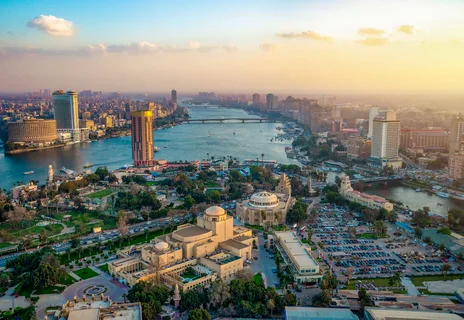Inflation Concerns and Global Risks Amid Policy Shift
Last month, Egypt made its first interest rate cut in nearly five years, a move welcomed by many but also met with caution from global financial institutions. The International Monetary Fund (IMF) has warned that while the country is making strides in controlling inflation, it must remain vigilant when adjusting its monetary policies, particularly as global uncertainties continue to persist.
First Rate Cut in Nearly Five Years
In a significant policy shift, Egypt reduced its key interest rate by 225 basis points last month, lowering it to 25%. This move came after annual consumer price inflation dropped to 13.6%, a notable decline from the 33% surge recorded in September 2023. The rate cut signals that inflationary pressures are easing, but experts caution that this could be a delicate moment for the Egyptian economy.
The IMF’s Director for the Middle East, North Africa, and Central Asia, Jihad Azour, emphasized the importance of careful consideration in any further reductions. He noted that Egypt should take a conservative approach to avoid reigniting inflation, particularly given the current volatile global economic climate.
Read More: Saudi Arabia’s Ambitious Oil Refinery Plans in India Stall Over Crude Supply Disagreements
The Global Context: Trump’s Trade Tariffs and Market Uncertainty
Global uncertainties, particularly those stemming from U.S. trade policies under former President Donald Trump, have led to fluctuations in global markets. Tariff hikes, particularly between the U.S. and China, have reshaped global trade dynamics and influenced inflation expectations. The IMF’s analysis indicates that Egypt’s monetary policy needs to account for these external pressures, which may limit the effectiveness of domestic economic measures.
Azour stated, “With the current shocks, we see a risk of a resumption of inflation, and therefore it’s very important to maintain the right policy in order to bring inflation down” to a stable, single-digit level.
The IMF is urging caution, especially as Egypt’s economic recovery is still in progress. While some economists forecast additional rate cuts of 600 to 800 basis points through 2025, these moves must be weighed carefully against potential risks, such as external economic shocks and geopolitical tensions.
Government’s Efforts to Stabilize the Economy
Egypt’s government, led by President Abdel-Fattah El-Sisi, has been implementing several measures to stabilize the economy after a period of severe economic turmoil. The government allowed the Egyptian pound to lose nearly 40% of its value over the past year, while simultaneously raising fuel, electricity, and other essential prices to secure crucial foreign loans and navigate the ongoing economic crisis.
The central bank’s previous rate hikes and currency devaluation were key strategies used to curb inflation and stabilize the national currency. While these actions were initially met with resistance, they have contributed to a gradual stabilization, providing some optimism for the country’s future economic outlook.
Also Read: UAE to Post Budget Surplus in 2025 Despite Lower Oil Prices
Caution from Former Finance Minister
Egypt’s former finance minister, Mohamed Maait, also echoed the IMF’s call for cautious policymaking. When asked if Egypt’s monetary policy was too restrictive, Maait advised restraint. “Given the current global and regional situation, you have to be very cautious,” he said. “You have to make sure that when you take steps, you are 100% sure that this is the right thing to do, according to data, analysis, and information. You cannot take a decision and reverse it later.”
His words highlight the fragility of Egypt’s current position. Despite the declining inflation rate, the risks of global economic instability, such as the ongoing trade war between China and the U.S., and regional geopolitical tensions, remain pressing concerns.
Outlook for Inflation and Future Interest Rate Cuts
The Central Bank of Egypt has expressed optimism about the country’s inflation trajectory, forecasting a continued decline in the coming years. However, the bank anticipates that the rate of decrease will slow down significantly compared to the sharp drops observed in early 2025.
Still, there are uncertainties. The IMF notes that the risks of inflationary resurgence remain high, influenced not only by global trade dynamics but also by regional conflicts that could exacerbate Egypt’s challenges.
As Egypt moves forward with its economic recovery, the IMF’s warnings and the caution from local policymakers suggest that the nation must tread carefully when making further monetary adjustments. Balancing the need for economic stimulation with the imperative of keeping inflation under control will be key to Egypt’s financial stability in the years to come.
Follow 10X Times for more business.






